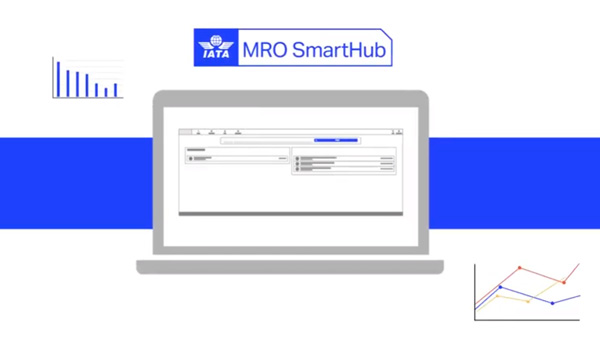With MRO SmartHub, IATA wants to reduce its members' maintenance costs |
| Emilie Drab in London |
|
|
31 OCT 2019 | 604 words
|
 |
© IATA |
|
|
|
The IATA's services portfolio expands a little more each year. The association has created a new tool to make operations easier for its member airlines, this time in the maintenance sector. The MRO SmartHub, which was unveiled in London at the end of September, was presented at MRO Europe exhibition. It is an interface which enables airlines, MRO service providers and OEM to have a better view of the aviation parts and components market. The IATA estimates that it could reduce their costs by 10% to 15%.
This platform was developed in ten months by the German company Opremic Trade and provides two services: Evaluator and Connector. With Evaluator, airlines, MRO and OEM can estimate the value of the parts they have and offer them to the market. Each airline which subscribes to the MRO SmartHub can then see the actual value of a part, an estimate of its cost and repair time and its availability. The tool can also recommend the best solution. With Connector, someone who is interested in a part may be connected to the company selling it and discuss all its aspects. "Of course, the MRO SmartHub will be developed further over the coming weeks and months and will have new features and improvements based on our customers' feedback", says Bretton Wells, Business Development and Projects, Safety and Flight operations - Products and Services at IATA.
He explains that the MRO SmartHub "is a real decision-making tool which shines the spotlight on the maintenance used part market. It is a reliable, centralised, neutral and non-profit making reference guide. You have to subscribe to it, but the return on investment is exceptional". The IATA already has between four and ten customers interested in the MRO SmartHub, but only one has announced its participation: Lufthansa Technik.
The German MRO sees in this tool just what it has been seeking to create for several years: a transparent second-hand parts market. Fabricio La Banca, spare parts purchasing director at Lufthansa Technik, explains: "For a long time now, we have only purchased new parts from OEM or aircraft manufacturers. But we wanted to reverse the trend a few years ago to lower our costs and be more competitive. This was very difficult as information is very limited" .
Lufthansa Technik started by retrieving and repairing parts on its own aircraft to build up a data bank and find out the value of the parts and its inventory. Today, the company uses between 30% and 40% second-hand parts (with this proportion varying according to the type of component and its category). Its ambition was for the other players in the after-sales market to share their inventory and data with it for the market to become more transparent and for transactions to be made at the right price. "Second-hand parts should be less costly, but there are times when they are more expensive than new ones" because they don't appear to be available on the market, because the airlines which have them don't know their value and don't sell them, because sellers can raise the prices depending on how urgent the need is and so on.
But sharing data, especially when promoted by such a major player, is not something that's easy for everyone to swallow. The IATA's neutrality helps companies make the move.
The Association says that fleet maintenance is the third largest expense for airlines, at an average of 11% of their costs. Maintenance generated 82 billion dollars' expenditure in 2019, a figure which is set to reach 116 billion dollars by 2029 due to fleet growth (according to a study by Oliver Wyman).
|
|
 |
Emilie Drab
Assistant editor
Civil aerospace, Air transport
|
|
| |
They made this section possible |
|
|
|
|
|
|
|
|
|
|
|
|
|
|
|
|
Top stories |
|
|
|
|
|
Top stories
|